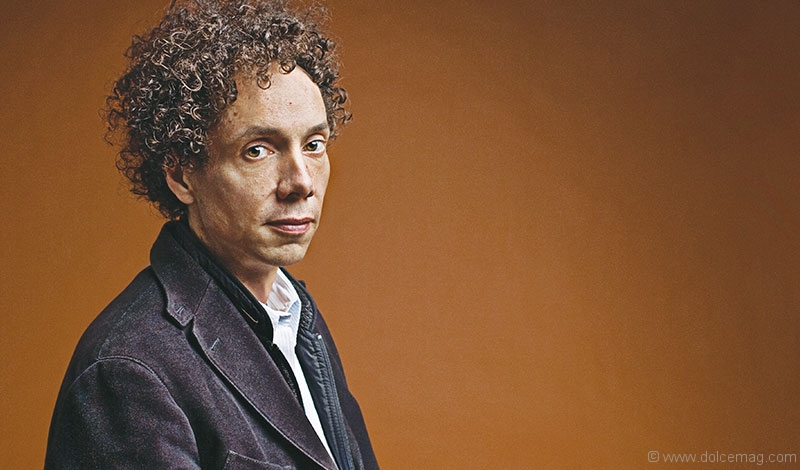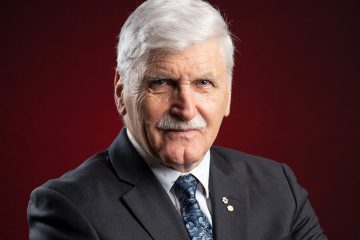Beyond Words
For a man who’s written a bestselling book on the power of first impressions, you could say that Malcolm Gladwell has an unfair advantage tonight. He’s back in his former stomping ground, under the lights of the Four Seasons Hotel Toronto, to accept an award for his groundbreaking literary accolades. Standing solo, the internationally revered writer’s wild tresses are a drop of oil in a sea of black-ties at the sold-out University of the West Indies (UWI) Benefit Gala. Gladwell appears coy, considering he’s coined some of the most-talked-about maxims of our decade, and yet the cliques of cummerbunds and couture gowns can’t unfasten their gaze from the modestly clad, withdrawn wordsmith. They wait anxiously for a breath of insight.
As the author of Blink: The Power of Thinking Without Thinking, it’s reasonable to call Gladwell a pundit of perception. But when asked how he would perceive himself at first glance, the writer can’t seem to find the right words. “I don’t know, I mean … it’s so hard for me to figure out how I’m perceived by others,” he says from his home base in New York City, a few weeks prior to the event. “I know that I’m a little bit reserved and I hope some of my passion for what I do would come across.” As an afterthought, he carries on to do what he’s become known for: sifting through life’s scientific, sociological ambiguities that are often difficult to swallow, leaving us with something deliciously digestible. “One of the things we do know from psychology is that we’re not very accurate in terms of our understanding of how we come across. Our sense of who we are and other’s impressions of us could be very different,” says the 48 year old. And yet, he couldn’t have illustrated a more accurate portrayal.
Many of the attendees tonight already know Gladwell through some degree of separation or another. They’ve either pored through his four bestselling books – Outliers, The Tipping Point, Blink or What the Dog Saw – read his transformative articles in The New Yorker, or like mutual fund magnate Raymond Chang, have met him at one of the dozens of speaking engagements he gives annually. “He is an amazing person. He can take an idea that you’d never think of, but once he presents it, it’s so obvious. The first question that comes to mind is, ‘Now why didn’t I think of it?’” says Chang. His sentiment bounces off the walls. “Malcolm Gladwell is probably one of our most creative thinkers in modern times,” says Nigel Harris, UWI’s vice-chancellor. “His way of looking at the world is absolutely different. He is just a marvellous generator of discussion and new ideas,” he adds, bringing testimony to one of Time magazine’s 100 Most Influential People.
Gladwell, who reads an average of 100 books a year, has spent most of his adult years observing the world and seeking novel explanations for life’s big and little phenomena. How did The Beatles become such outrageous superstars? Was Bill Gates really the gatekeeper to his tech triumphs? Why are most professional hockey players born in January, February and March? By dissecting historically significant success stories in Outliers, he flicked a light switch on in the nebulous stairway that once used talent, passion and IQ as its sole method of ascent. Perhaps there’s more to it, he argues. “The tallest oak in the forest is the tallest not just because it grew from the hardiest acorn; it is the tallest also because no other trees blocked its sunlight, the soil around it was deep and rich, no rabbit chewed through its bark as a sapling, and no lumberjack cut it down before it matured,” he writes. This ecological analogy sets the stage for a riveting book that debunks society’s uncomplicated explanation of success, and urges that hidden advantages, unparalleled opportunities, geography, birthdates and parental inheritances deserve far more credit. “I have become much more obsessed with the role of good fortune and good luck.”
An outlier himself, Gladwell attributes many of these themes to his own success. “I think I’ve been the beneficiary of an enormous number of advantages.” He traces it back to a series of remarkable opportunities presented to his Jamaican grandmother Daisy, who in turn, was able to send her daughter Joyce to a university in England, where she met Graham, a fellow student. They later married and gave birth to Gladwell.
Settling into the tiny southwestern Ontario town of Elmira when he was six, Gladwell continued along a path paved with possibilities. “I got into a really extraordinary community where my family – a mixed-race family – was accepted without even a hint of prejudice. That was gift No. 1: to be treated as a human and not as a kind of oddity, or an object of disdain or hatred,” says Gladwell, who’s mother would sometimes let him stay home from school to read. A second gift came in the form of having a mathematician father and a psychotherapist mother, who taught him the value of clarity. “I can remember doing math homework with my father and the first thing he would do is take my notebook where I’d scribbled a million different notes and just start with a fresh page. He’d say, ‘Start over and do this as simply and clearly as you can.’”
There is another cogent link in the chain of success that warrants a mention, a now popular theorem he presents as the 10,000-hour-rule in Outliers. It’s a principle that suggests success is a product of practice, 10,000 hours, or approximately 10 years, to be precise. Along with Gates and The Beatles, Gladwell is a testament to it. In fact, he vividly remembers the day his practice finally made perfect. It was Dec. 7, 1993, and news of a commuter train massacre was about to shock Long Island, NY. As a reporter for the Washington Post, Gladwell was on the scene. The only tools he had were his memory, and a decade of experience working in the field. He phoned the newspaper’s New York bureau and began telling the story, formally dictating a 2,000-word, front-page piece “just off the top of my head,” he says. His account of details makes you want to inspect his back for a dragon tattoo, for only the late Stieg Larsson could have imagined a character quite like him. “I did not have that talent when I started, but after 10 years I did.” Detonating his well-deserved aplomb, he quickly interrupts himself. “Yeah, I can no longer do that, by the way,” he laughs.
Looking back, Gladwell remembers arriving at the Washington Post as a raw reporter that often took weeks to complete a story, seven days just to write two paragraphs in at least one instance. “I was incredibly slow and halting, and didn’t know what I was doing. I think that it’s no coincidence that the great storytellers are so often people who are real sort of veterans, you know, we’ve been writing for a long time to master the demands of storytelling,” says Gladwell, who spends time studying the work of Michael Lewis, one of the authors he admires. “Great storytelling is patient: it allows the story to unfold at its own pace, but in order to write with patience, you have to have an awful lot of confidence.”
Someone who has witnessed Gladwell’s personal story unfold over the years is Jim Balsillie, former Research in Motion co- CEO. “For sure, happy to talk about Malcolm,” writes the-then BlackBerry board member in an email. We arrange to speak over the phone while he’s en route to a meeting. For a man who’s been steering away from a recent maelstrom of media attention, he seems eager to talk about his old friend. His phone call arrives right on time, 8:30 a.m. on a Thursday morning. “We were a bunch of kids trying to make our way, and you know, no one more than Malcolm,” he says, noting that Gladwell still looks just the same 32 years later. The two met at University of Toronto’s Trinity College in the early ’80s, where they would spend four years together attending classes, being dorm neighbours, jogging, partying, and eating breakfast, lunch and dinner side-by-side, sometimes seven days a week.
Balsillie has an internal scrapbook of memories filled with good times spent with Gladwell, but nothing seems to stir him more than looking back on their intense backgammon games, often 10 a day. “He beat me like 925 games to 875 … he was like, ‘Let’s call it the ‘juggernaut,’” says Balsillie, admitting he didn’t know the meaning of the word back then. “I was like, ‘Oh great idea,’ and we laughed and then I’d have to go into the dictionary.” Though Gladwell majored in history, Balsillie says there were obvious signs of a word master in the making, especially when his newsletter for the Trinity football team became a hit. “He would parody in the most hilarious way, all of the sort of extensive sports clichés, so it became this overly earnest, hilarious, funny written report.” In terms of his accomplishments, Balsillie couldn’t be prouder of Gladwell, who he continues to call a good friend. “He’s a really good guy and he’s very good-natured and I think he just loves the clever word and the clever thought and the clever twisted phrase, and he’s bloody, bloody good at it.”
These days, Gladwell stays inspired by the buzz of public spaces. His morning ritual begins in the organic coffee shop. Grounded in New York City, where he’s penning his next book slated for release in 2013. “Very, very broadly, it’s about power,” he says, reluctant to elaborate. His life is a sweet one, but when it comes to defining the source of it he wavers once again. “I don’t know. I guess I would say that I just try to stay curious, and I think the sweet life is a balanced life.”
At the end of our conversation, I inform Gladwell that we share the same birthday, September, 3rd. I’m not at all sure what that means or why it’s relevant, but given the nature of his work I feel as though he might have some profound explanation for it. “Well then, we share the same strengths and weaknesses,” he says. For a second, I imagine what life would be like if only that were true.
Gladwell accepts his award with the wordplay he’s become renowned for in literary circles. The bashful writer and speaker who was standing coyly at the centre of the VIP room just a few hours ago is now centre stage in a large reception hall, causing the crowd to swell with laughter. “I was told that I have three minutes, but I wasn’t told whether that’s a Jamaican three minutes or a Canadian three minutes,” he jokes. First impressions are powerful, but Gladwell proves it’s a lasting impression that prevails.













































































No Comment